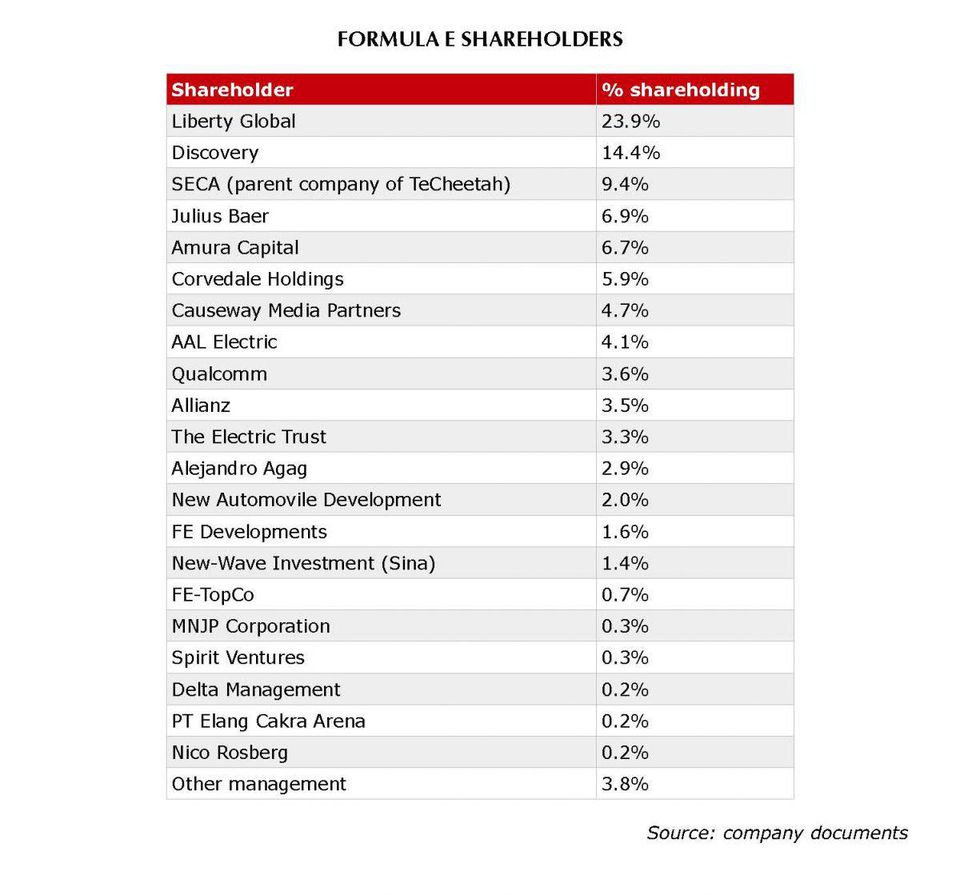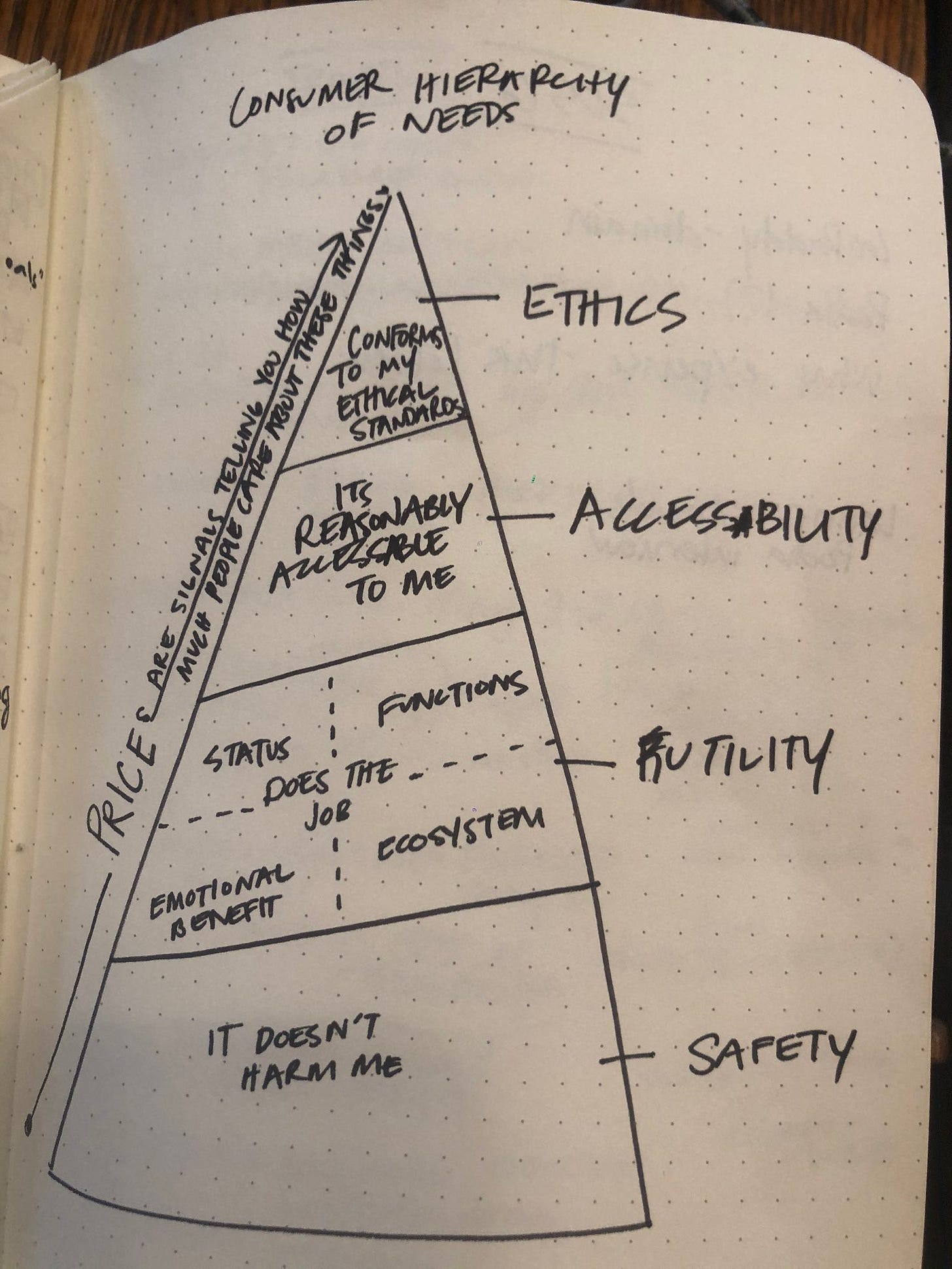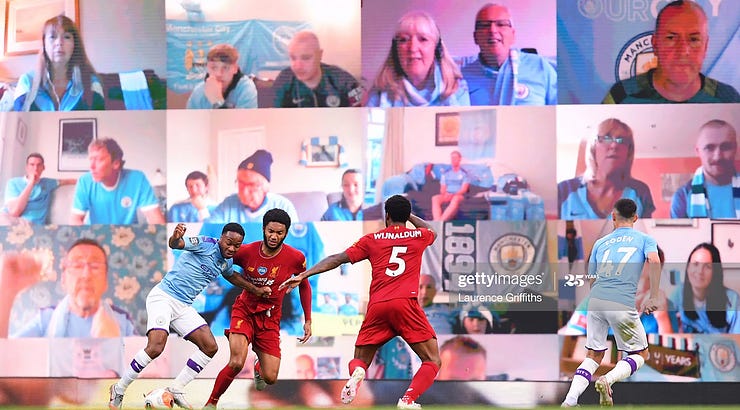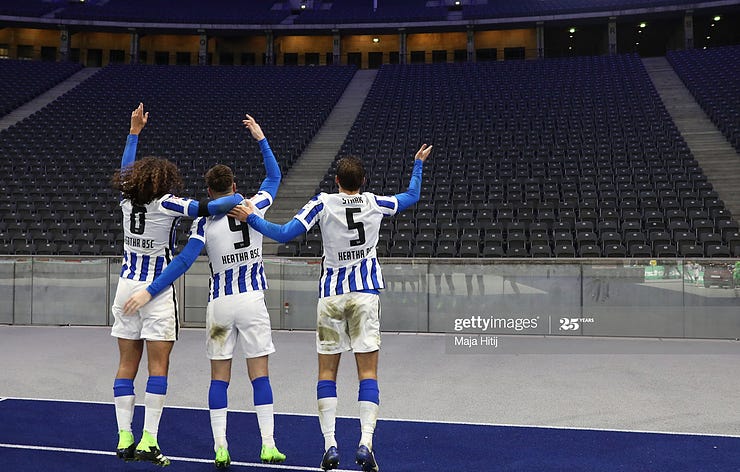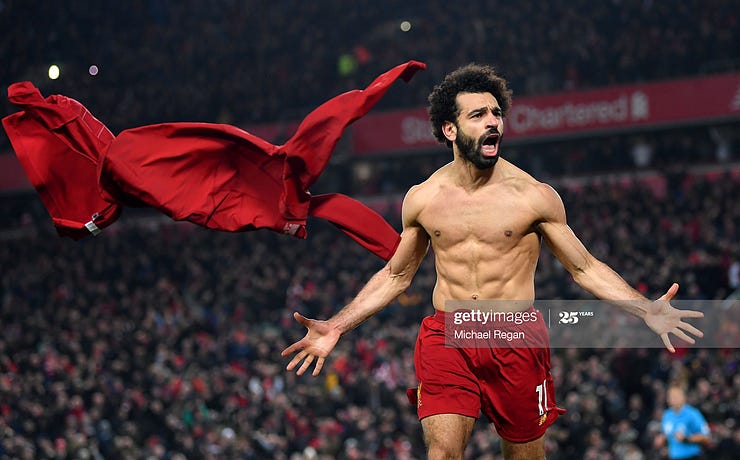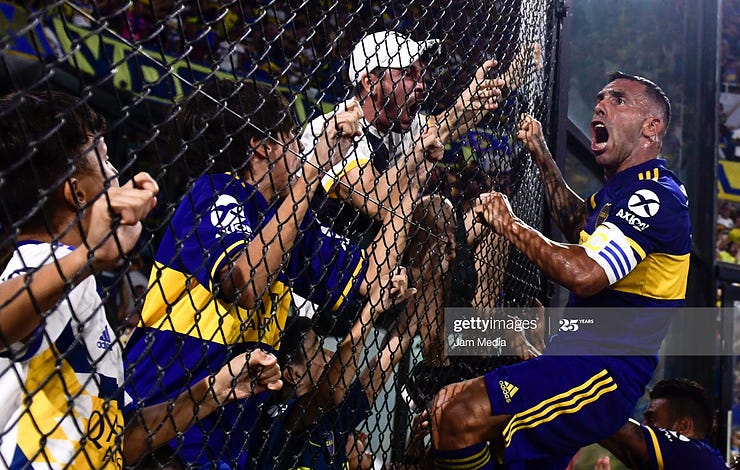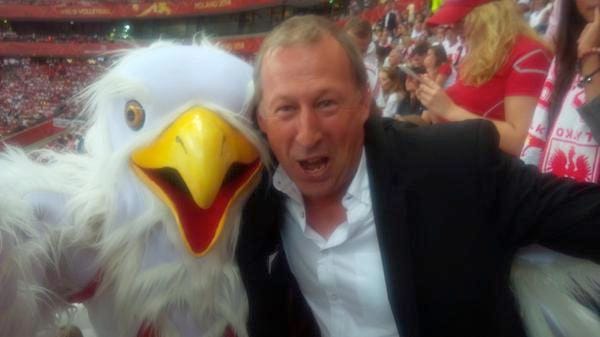No Hugging, No Learning
In this week’s Unofficial newsletter:
The tricky business of learning lessons from Formula E
Sport’s brand purpose problem
Faris Yakob’s hierarchy of needs
The 10 best football photos of 2020
Remembering Kevin Roberts
Money Talks
Episode 5 of Money Talks, our podcast series on sport and finance is out now. This week’s guest is Marcus John, CEO of Sports Capital Advisors, based in Singapore. The threads of the conversation include:
The long term impact on sport of Teddy Forstmann’s buyout of IMG in 2004
Differentiation in the market for sports capital advice
The lessons learnt from early stage investment in Formula E
Asia’s investor class eyeing European and North American sports IP
Early stage questions from a Formula E investor
Formula E is one of the standout sports startups of the last decade. And because of this, there’s a desire among the sports business to learn lessons from its backstory.
Set up in 2014, the series features cars that are powered by a 250kW motor giving them a top speed of 280kph (174mph). They are 25% slower than Formula One cars but produce little noise and no emissions. Manufacturers including Audi, BMW, Jaguar, Nissan, Porsche and Mercedes use it to demonstrate they're green credentials.
Formula E Operations is based in London and its biggest shareholder is Liberty Global which has a 23.9% stake followed by Discovery Communications. The others are listed here, taken from company documents (from 2017).
Marcus John was an early stage investor, and like every startup angel he was risking capital in the expectation of rapid growth and future returns. He says in the podcast:
The doubt was whether electric will be the next big thing. That was the big ‘What if?’
Deloitte’s latest report suggests that question has been answered and the series is now part of the marketing plans of several major car makers seeking to normalise the use of electric cars over the next decade.
What if the purpose is better than the product?
We should all be wary of seeking to learn lessons from someone else’s perceived success, because it’s so hard to identify what went right.
For many people, the convenient lesson of Formula E is about brand purpose.
The founders started with why, and the race series contains all the elements that have come to define a 21st Century sports property: it has a clear ‘why’ at its core - saving the planet - and the commercial messages are imbedded in to the content.
That’s all fine, but my problem is I DON’T CARE WHO WINS.
Formula E still feels like a good idea with a sports property attached. Every conversation I’ve ever had about it has been about the cars’ emissions rather than the thrill of the racing. It all feels very supply driven, and by that I mean, if it disappeared tomorrow, the only people mourning its demise would be in the marketing departments of the car makers, who lose a valuable comms platform for their electric messages.
This problem can be overcome and may define the next phase in Formula E’s development. The rise of the IPL has proven that team allegiances can be created by clever marketing - note Manoj Badale’s comments on this in Pod #125. The difference is that today’s IPL fans were already cricket obsessives, making the league and its franchises an unreliable guide to growing an audience in other sports.
The counter argument to sport’s purpose play
Brand purpose is a topic that now pervades the sports marketing conversation.
Its premise is beguilingly simple: the ethical behaviour of companies impacts consumer buying choice, and vice versa. By adding a purpose to a sport property - or even an individual athlete - this differentiates it among viewers, fans and sponsors.
We all want this to be true and the world would be a better place if it were. But like all easy to follow stories, brand purpose should be handled with care, and we should avoid what Richard Shotton calls ‘wishful seeing’: the tendency to view the world how we want it to be rather than how it actually is.
Some of the origins of brand purpose lie in a book called Grow by Jim Stengel, ex-CMO of P&G.
Stengel chose 50 brands with the highest loyalty or bonding scores from Millward Brown’s 50,000-strong database which he called the Stengel 50. He then sought to define what links these 50 companies and landed on the notion of ‘brand ideal – a shared intent by everyone in the business to improve people’s lives’.
Next he looked at the chosen brands’ stock value growth between 2000 and 2011. Since the Stengel 50 had grown by 393% compared with a 7% loss for the S&P 500 benchmark, he declared that ideals were driving business success. Ideals supposedly didn’t just drive growth, they led to stratospheric success.
But, there have always been concerns about the reliability of the evidence.
For the (purpose) theory to be valid the brands in question must be linked by an ideal. Unfortunately, even this doesn’t seem to be true.
First, the claim that all 50 of the brands exhibit an ideal is suspicious. The reason Stengel claims such widespread uptake of ideals becomes apparent when you examine his definitions. He stretches the term ideal to such an extent that it’s meaningless.
Have a look at his definition for three of the brands:
• Moët & Chandon “exists to transform occasions into celebrations”.
• Mercedes-Benz “exists to epitomise a life of achievement”.
• BlackBerry “exists to connect people with one another and the content that is most important in their lives, anytime, anywhere”.Notice a problem? These ideals are just category descriptors. They could apply to any champagne, luxury brand or handset provider.
If the term ideal can cover anything, then it’s meaningless.
In sport, every rights holder has spent the last decade layering in purpose to their core marketing messages, allowing sponsors to campaign on social causes. But the same question applies, if the mission statement could apply to any sport, then what’s the point?
What if, ethics are a luxury good?
Early Unofficial Partner guest Faris Yakob (Pod #17) frames it like this: ethical consumption is a luxury good.
What old Abe Maslow would make of this diagram is besides the point, it feels right (via @rosieyakob).
The 10 best football photos of the year, from a bloke who should know
Paul Gilham, director of photography at Getty Sport, gave us his favourite pics from a weird and wonderful year of football. Here’s a quick sample, click here to see the rest.
Finally, a word about Kev
Last week we heard the shocking news that Kevin Roberts had died suddenly at home. I remain stunned, and we decided to hold off on publishing last week because we just didn’t feel we wanted to do the necessary ‘look at me, look at me’ dance across social media at that moment.
I was asked to write a brief piece on Kev for SportBusiness, and reproduce it below. Here’s my favourite picture of the great man. God, I’ll miss him.
“Don’t take it too seriously.”
That was an early piece of Roberts advice and I quickly got what he meant. He understood the game being played, the levers being pulled. He revelled in the humdrum, often deeply silly reality that lurks just below the grand sounding ‘business of sport’.
He’d catch my eye as the serious-faced young PR man pitched Afghanistan as sport tourism’s next big destination. He kept a straight face as the expensive branding consultant told him she wanted the tone of voice of the magazine to be ‘more Jamie Oliver’.
We once ran a headline plugging Gary Stevens’ new insurance business, the one he’d started after Vinnie Jones had put him into row J of the old White Hart Lane. It should’ve read “Gary Stevens talks about the pain of a career ending injury”. The printers had other plans, so we got: “Gary Stevens talks about the pain of a reer ending”. Kev loved it.
His ideas for stories were always the best, the most creative, the ones you actually wanted to read. He knew that, but gave ours airtime anyway, gently offering advice as to how to make them better.
Yes, Kevin was charming and witty, and the very best company, full of mischief and gossip. But charm alone is a cheap trick and we’ve all known people who coldly trade on it for personal or career gain, and who see conversation as a competition to be won.
There was far more to Kevin than that, and that’s why we loved him. He was kind; a warm, generous and vulnerable friend, who took the time to listen, often surprising you by casually recalling small details of previous conversations you’d assumed had got lost in the noise of the bar.
When I first met Kevin, I was a teacher who wanted to be a journalist and he gave me a first foot in the door. Ironic, really, as he was the best teacher I ever had.
Jon Tibbs passed on the initial news via WhatsApp. I’m sharing the following exchange because it captures both the shock we all felt and the genuine affection with which Kev was held by all who met him.
[10:03, 03/12/2020] Jon Tibbs: Kevin was one of my closest friends in the industry going back to the early nineties. I had lunch with him a few weeks back just before 2nd lockdown and we laughed so much reminiscing over the last 25 years. A nice final memory to have.
[10:04, 03/12/2020] Ben Wells: That is terrible news. Kevin was such a warm character. So sorry to hear it, he was much respected and much loved in the industry.
[10:04, 03/12/2020] Darrell McLellan Fordyce: That is a huge shock. What a star and what fun I shared speaking at and attending so many conferences with him.
[10:05, 03/12/2020] Marcus Luer: Wow, sad news 🙏
[10:07, 03/12/2020] Michael Broughton: Urgh. Had a lovely catch up with him a couple of weeks ago. Was always a fun conversation. Will be missed.
[10:10, 03/12/2020] Patrick Nally: I can't believe it, we have been so close for so many years, what very sad, sad news.
[10:10, 03/12/2020] Simon Oliveira: So sorry to hear Jon, he will be missed
[10:12, 03/12/2020] Matt Rogan: That’s awful. Lovely guy, we will all miss his enthusiasm and passion.
[10:12, 03/12/2020] Richard Gillis: I can’t believe this, I spoke to him last week, and had lunch the week before lockdown.
[10:17, 03/12/2020] Scott Bower: Awful. Just awful
[10:19, 03/12/2020] Scott Bower: A top top man
[10:20, 03/12/2020] Richard Gillis: Saw him with Matt C a few weeks ago, usual boozy lunch, laughing, moaning etc etc.
[10:20, 03/12/2020] Richard Gillis: Fuck
[10:21, 03/12/2020] Eoin Connolly: Just terrible news. What a great guy. Helpful and decent, always good company. So sorry to hear it.
[10:23, 03/12/2020] Giles Morgan: This is the saddest of news. One of the truly nice guys in our industry.
[10:25, 03/12/2020] Murray Barnett: A fixture for all in the sports business. The nicest guy. Life is short.
[10:27, 03/12/2020] Jim Bruce-Ball: Sorry to hear such sad news. Knew him a little from Sarah’s time at SportBusiness and seemed like an incredibly good bloke. Condolences to all those who knew him.
[10:29, 03/12/2020] Sujit Jasani: Desperately sad news. Shocked.
[10:33, 03/12/2020] Alex Goldschmidt: So sorry to hear this awful news. A lovely man. Sending my thoughts to all who news him well.
[10:34, 03/12/2020] Tim Crow: Desperate news, but these tributes are terrific to see. I will miss him and our conversations and bets about Halifax Town v Dover Athletic (his team) very much.
[10:35, 03/12/2020] Thierry Borra: sad news indeed...
[10:35, 03/12/2020] Alex Willis: So sorry to hear this news. Sending condolences to his family and all those who knew him
[10:37, 03/12/2020] Sean Singleton: Shocking news, I only met him a few times, but seemed to be a very lovely & incredibly decent guy. Condolences to all that were very close to him, which seems to be many.
[10:42, 03/12/2020] Drew Barrand: God - just saw this. this is horrible. One of my first ever bosses. A proper legend. Only spoke to him a couple of weeks ago. Im shocked.
[10:45, 03/12/2020] Tony Singh: This is awful. Kevin was so kind and generous when I knew nothing and nobody. Was one of the first people I saw when I came back to sport. Lots of brilliant memories going back twenty years. We should get together and raise a glass in his honour when conditions allow.
[10:49, 03/12/2020] Darrell McLellan Fordyce: Good idea. I have fond memories of sitting on a hotel roof terrace in Istanbul drinking some wine with Kevin while we commented on the smoke of various burning cars from rioting factions getting closer and closer to the hotel.
[10:51, 03/12/2020] Tony Singh: My favourite is drinking in Shanghai with Kevin, Jimmy Worrall, Rachael Church and Will Muirhead, trying to suppress laughter / avoid execution while Will tried to score opium from random Chinese people
[11:06, 03/12/2020] Joel Seymour-Hyde: That is incredibly sad. RIP to one of the Sports Industry’s good guys - clearly much loved and a big influence on many careers.
[11:29, 03/12/2020] Nathan Homer: Just come to this awful news, but massively lightened reading the lovely tributes down the thread, echo Tony’s words on his generosity to help as I started my journey when he had no need. Lovely chap.
[11:39, 03/12/2020] Simon Chadwick: My apologies for coming late to this. I can't believe it, I just can't believe it. This is such sad news. I was only talking to Kevin three weeks ago. Of course, he had to mention Crystal Palace. I remember going to the Sport Business office on York Road back in 1996, when virtually nobody in academia had an interest in sport and business. Yet in Kevin, I found a warm welcome, an open mind, and a good guy who became a friend. If anyone out there knows his family, please extend my sincere condolences to them.
[15:03, 03/12/2020] Adrian Bevington: Wonderful tributes guys. Also across social media. Sad news but clearly a highly regarded professional and person.
[15:14, 03/12/2020] Sophie Goldschmidt: How terribly sad. Devastating for many. Such a respected pro.
[15:31, 03/12/2020] Jonty Hill: Really lovely man and a huge supporter of all sport.
[15:36, 03/12/2020] Jane Purdon: I didn’t know Kevin but reading all your responses it feels like I’ve missed out. What impact he had to trigger such sadness and also such wonderful tributes.
Rest in Peace Kev.




